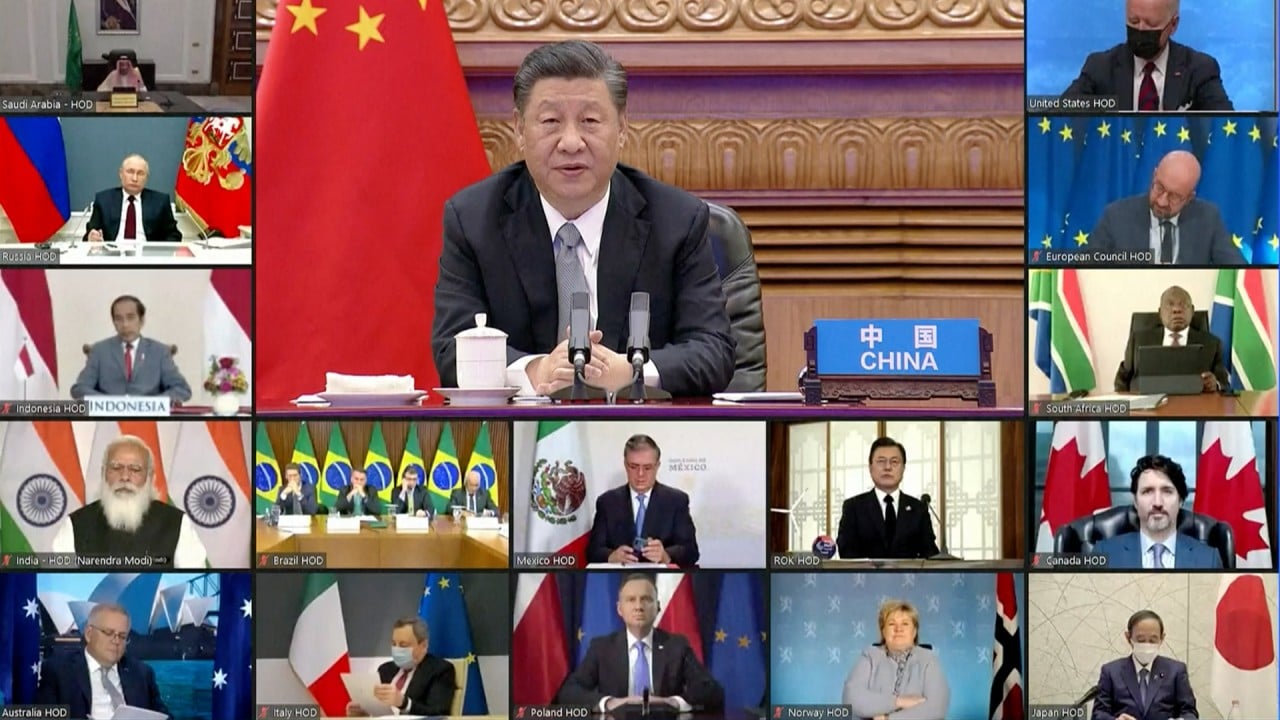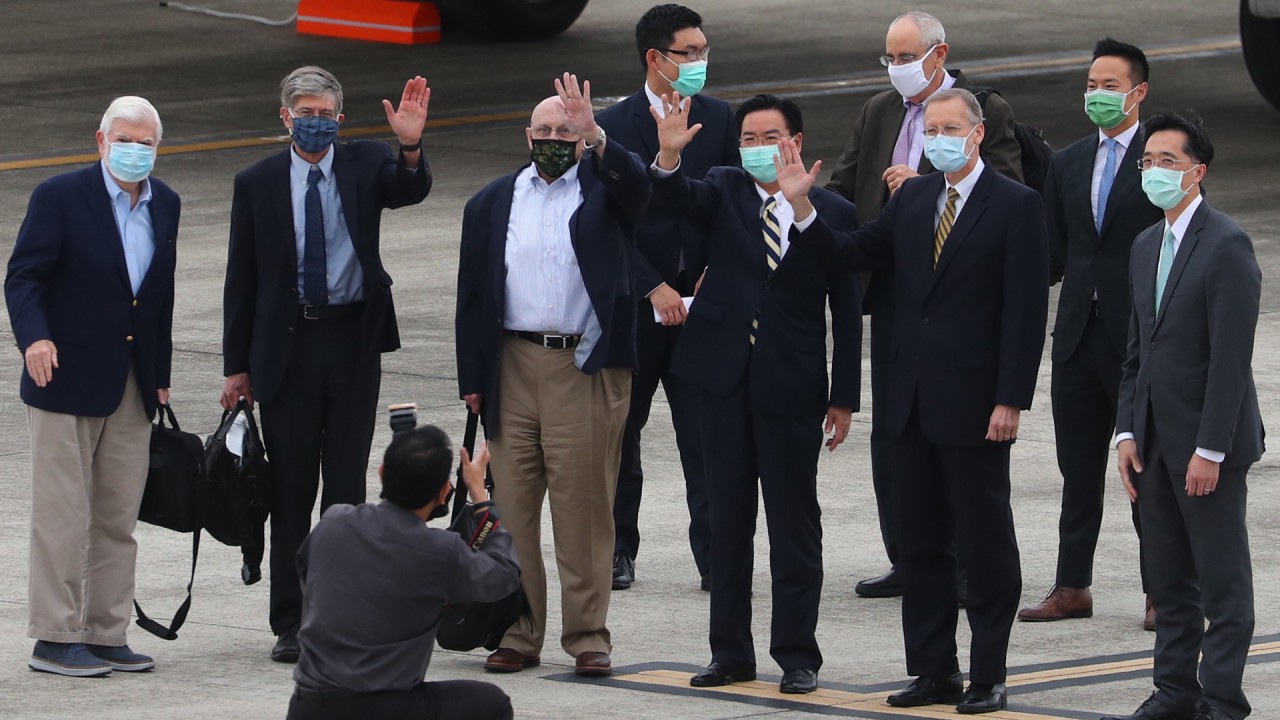
Joe Biden 100 days in: little difference from Trump in attitude towards China, analysts say
- But analysts see Biden narrowing the scope of restrictions in order to avoid a full decoupling with Beijing
- Biden’s presidency will pass the 100-day mark on Friday, a symbolic milestone against which administrations are often assessed
Biden’s presidency will pass the 100-day mark on Friday, a symbolic milestone against which administrations are often assessed, both in terms of their adherence to campaign promises and what it signals about the remaining 45 months in office.
When it came to US Secretary of State Antony Blinken’s blueprint to engage with China along three lines – confrontation, competition, and cooperation – the administration’s first 100 days had skewed toward confrontation with elements of competition, according to David Dollar, a former US Treasury emissary to China.
“There is little evidence of cooperation, the one exception being Xi Jinping’s participation in Biden’s virtual climate summit,” Dollar wrote in a Brookings Institution analysis posted this week.
China ups defence spending in 2020 but ‘economic growth cushions increase’
Speaking to reporters on Tuesday to discuss Biden’s national security priorities, a senior administration official said the government would “not shy away from hard topics and addressing them directly with China”.
“Nor, by the way, are we going to shy away from taking meaningful action, including in the sanctions space and other steps when it comes to gross violations of human rights such as those that are occurring in Xinjiang, which we’ve obviously said amounts to genocide,” said the official, speaking on condition of anonymity.
But despite Biden’s willingness to maintain or even escalate tensions with Beijing on a number of areas, his first 100 days in office have seen some congressional Republicans continue efforts dating back to the presidential campaign to paint him as too friendly with Beijing.
“He’s been a disaster on foreign policy,” South Carolina Republican Senator Lindsey Graham told Fox News over the weekend. “Russia and China are already pushing him around, so I’m very worried.”
Republican China hawks including senators Ted Cruz of Texas and Rick Scott of Florida have sought to paint a number of administration moves as indicative of a weak approach to handling Beijing, including Washington’s rejoining of the Paris Agreement and Biden’s military budget request.
Scott accused Biden of “weak defence spending” and suggested he sought to “appease Communist China.”
Republicans have also homed in on Biden’s decision to dispatch climate envoy John Kerry to Shanghai this month to meet Chinese counterparts, expressing concern that Beijing would seek concessions in return for climate commitments.
Africa should beware China’s growing role, top US diplomat Antony Blinken warns
This deeply divided political environment all but ensures more conflict between hard-line Republican lawmakers, like Scott, who demand confrontation with Beijing, and the more business-friendly Republicans and Democrats pushing for a clearer strategy outlining where Washington should keep up the pressure and where cooperation will be necessary.
The latter group continues to work on changes to the Strategic Competition Act of 2021, introduced by the Senate Foreign Relations Committee’s Democratic chairman Bob Menendez and Jim Risch of Idaho, its senior Republican, which addresses economic competition with China, as well as issues like Hong Kong and Xinjiang.
The senior administration official on Tuesday was eager to amplify the emerging focus on multilateralism as a significant departure from the Trump administration’s approach, which they described as “alienating our allies, in some cases push[ing] them closer to some of our competitors”.
In a sign that EU leadership is warming to the prospect of a closer alliance with Washington under Biden, leaders of the bloc recently warned members that the EU and Beijing had “fundamental divergences” on matters including economic systems, human rights and relations with third countries.
In an internal letter obtained by POLITICO, European Commission President Ursula von der Leyen and foreign policy chief Josep Borrell said those differences “must not be brushed under the carpet” and argued that the bloc should “accept [the Biden administration’s] open hand and work together, whilst asserting our own stance, and our own interests, on the world stage”.
Sourabh Gupta, resident senior fellow at the Washington-based Institute for China-America Studies, said while Biden seeks to expand cooperation with allies, his decision to leave many of the Trump administration’s other policies intact was shrewd because this would be the only way Beijing would continue with reforms pushed by successive White House administrations.
Citing ‘stunning’ coronavirus progress, Joe Biden celebrates easing of US mask rules
But the time was ripe for Biden to start scrapping punitive tariffs, which have been “damaging for both sides”, said Gupta. The administration must also rein in, and more clearly delineate, the scope of unilateral restrictions on trade with China to avoid giving Beijing cover to put restrictions on US companies, he said.
The Trump administration “demanded that China play on a level playing field and now the US is skewing that playing field by trying to cut China off at the knees in terms of certain core technologies, and that’s why it becomes important as to where they draw that targeted red line”, Gupta explained.
The Commerce Department’s first tranche of “military end user”, or MEU, companies include 58 Chinese companies – including the Aviation Industry Corporation of China (AVIC), the state-owned military aerospace contractor that is a key supplier for a commercial aircraft that Beijing is trying to bring to market – and 45 Russian ones.
“Nobody gives away a free ride to others on national security, but if this is to gain an advantage in terms of economic competitiveness, that is making the level playing field unlevel,” Gupta said. “The US has been harping for a long time for decades that we need fairness in terms of this technology exchange and technology cooperation.”
Biden’s administration is undertaking several reviews dealing directly and indirectly with China, the results of which will guide the US leader’s strategy in terms of technology trade with the country.
This includes a 100-day review, announced in February, of the supply chains for semiconductors and advanced batteries used in electric vehicles, followed by a broader, long-term review of six sectors of the economy.
Weifeng Zhong, a fellow at the libertarian Mercatus Centre, agrees that a more targeted policy on China is more likely, with the administration beginning to withdraw tariffs and some of the more broadly applied limits on business with China while keeping in place restrictions on sales of advanced semiconductors to the country.
Coronavirus: those inoculated with Chinese, Russian vaccines could face travel inequality
Biden is “trying to figure out the bliss point between engagement decoupling, so I think the US is now at a critical juncture in really having to find just the right point in between the two extremes”, said Zhong.
And the administration is weighing its China options at a time of bitter division within both Congress and the American public at large, with deep fractures around issues including racial justice, taxation, economic recovery and immigration.
In a sign of the polarisation, Biden’s approval rating at the 100-day mark stands at around 52 per cent, according to a Washington Post poll of more than 1,000 adults. While significantly higher than Trump’s 100-day rating at 42 per cent, the figure is less than that of any other president since Gerald Ford in 1974 (48 per cent).
That leaves a small margin of error for Biden on any policy front, giving him limited latitude on how much he can start to diverge from Trump’s policies.
Consensus is much clearer when it comes to China, however, with some 89 per cent of US adults considering China a competitor or enemy, according to a Pew Research Centre survey published last month.
“We can’t go back to what we did in the past 20 years and just say let’s go make the money,” Zhong said. “I think the American public will have more and more pushback if policymakers go that route.”




